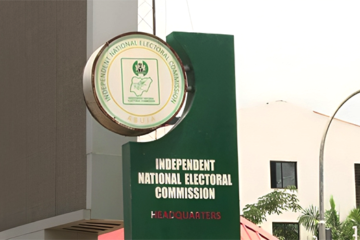[OPINION] The audacity of impunity

Simon Kolawole
By Simon Kolawole
Let me guess: because there was a widespread belief that President Bola Tinubu would run a corrupt, laissez-faire administration, some of his appointees decided to hit the ground running by spending public funds with impunity and audacity — and gleefully spitting on due process. There is corruption and there is impunity. And then, there is audacity. From the very beginning, we started hearing salacious stories, or allegations, of bags of dollars being dragged into and out of the offices of powerful government officials; lobbyists and aspiring political appointees spreading goodies around for “facilitation”; and an undisguised sleaze in the 2024 budgetary process at every stage.
In the multitude of alleged infractions, Dr Betta Edu (hereinafter referred to as “Betta” in exercise of my poetic rights) has suddenly jumped to the front of the queue. She has been accused of all sorts within the four months she spent as minister of humanitarian affairs and poverty alleviation before her suspension. I am not here to judge her — I should know Betta than declare her guilty when a court of law has not done so — but I do know for sure that many things were wrong with the way she ran her ministry. I do not need to travel far in search of evidence. Some things that have come to light in the last few days are self-evident. In fact, her response to the allegations were self-indicting.
If I want to be kind to her, I would say she was naïve. But from what we know about her person — partly thanks to Tik Tok — naivety should not be the first word that comes to mind. If there is a naivety component, it is insignificant. For someone who was once a commissioner in Cross River state, we cannot successfully argue that she was inexperienced in public service affairs. I have always observed this “in your face” public posturing about her, something like “you can’t touch me” — as you would expect of someone who possesses not just money and power but also a cocksure assurance that she can do anything and get away with it. She clearly did not manage herself well.
To start with, how can a minister initiate and send a memo directly to the accountant general of the federation to make payments? Minister? What does the permanent secretary, the chief accounting officer of the ministry, do for a living? How can a minister ask the accountant general to pay N585 million into the private account of a “project accountant” — regardless of a subsisting circular banning such practices?
Most curiously, how come the payment was still made despite the accountant general rejecting the request and declaring it as a violation of the rules? The Nigerian system is broken, we know, but you still want to assume that some things should never happen.
Because Betta was hyperactive and always at the centre of things, we could be tempted to regard everything she did as part of her wiring. But, no, I would not fall for that bait. My sense is that she knew what she was doing. I am inclined to think that she believed she could do and undo because of her powerful connections. She first insisted that due process was followed. While she was trying to pull the wool over our eyes, it emerged that she had also approved flight tickets to Kogi state, where there is no airport. At this stage, Betta’s resistance started getting weaker and weaker. I don’t know what happened next but Tinubu swiftly decided to suspend her, and the EFCC is now on her matter.
There are many things to unpack in the Betta saga. Some of the issues I have identified so far relate to due process, suspected fraud, potential conflict of interest, and possible corruption. In my own way of thinking, I am seeing beyond Betta. I am seeing a rotten, broken system that enables infractions. Many of Tinubu’s ministers, I am told, do not give a hoot about due process. They relocated to Abuja with the impunity and audacity from their states. Some are not on good terms with their permanent secretaries and are sidelining them in running their ministries. They will soon discover that the federal civil service can be brutal and unforgiving. Betta is the first casualty.
In order to bypass due process and undermine bureaucratic processes, some ministers reportedly go directly to the president to complain about being “held back” by the system. The story they tell Tinubu, according to insiders, is that the perm secs are a clog — rather being than a cog — in the wheel of progress. “Mr President, these permanent secretaries are trying to frustrate your Renewed Hope agenda,” they would whisper to him. Some worried perm secs decided to step back, knowing that the “gra gra” would end in tears sooner or later. Even when we all know that the Nigerian civil service does not cover itself in glory, there is definitely a reason that processes were put in place.
If the processes are cumbersome and tiresome (there is a reason modern-day bureaucracy is globally criticised for “red tapism” — literally the colour of the tapes used to wrap official files and stack them away), the sensible and legitimate thing to do is to seek a reform. There is no doubt that we need to review the decision-making and operational processes of the civil service for greater efficiency. If I were Tinubu, I would seize this opportunity to initiate a reform. Even then, the processes of spending public money should never be left to somebody’s whims. Transparency and accountability are principles that should guide civil servants and political appointees at all times, no matter the reform.
In addition to the issue of due process, that a minister would approve flight tickets from Abuja to Lokoja which does not have an airport also exposes a lot about the civil service. If the monies were disbursed, that would be fraud. I do not for one minute believe that Betta benefited from this, but she signed off on it, so she cannot possibly escape culpability. It is also very common in the civil service for people to claim allowances for non-existence trips and unofficial travels — or prolong out-of-station trips in order to collect bulky duty tour allowances (DTAs). This is a way of “taking care” of the junior officers who do not have access to the billions their bosses toy with. It is fraud still.
As an aside, I think it is also important to review the measly and unrealistic allowances we give civil servants when they travel out of their primary place of work. How can we pay N20,000 per day for DTA for a trip to Lagos? Can N20,000 get a decent hotel room, much less cover feeding and local transport? Giving a government official money that cannot pay for a room even in bug-infested hotels leads to temptation to increase the number of days for official trips or include air tickets and airport taxis to places without airports. It is a realistic need — not essentially to make civil servants happy. I know many honest civil servants who would rather not travel than be put in such positions.
Oh, I almost forgot. Planet Projects Ltd, a company co-founded by Mr Olubunmi Tunji-Ojo, the minister of interior and who happens to be Betta’s bosom friend, got a lovely N438 million consultancy contract from the humanitarian ministry. To his credit, he has strenuously maintained that he resigned as a director of the company in 2019 when he was elected into the house of reps. Therefore, he is no longer a director. No law bans a minister from owning shares in a company. His wife, a co-founder, remains a shareholder of Planet Projects. Tunji-Ojo remains a shareholder too. And Betta remains his bosom friend. There is no law banning two ministers from being friends.
But is it right for Betta to award a contract to a company related to her minister friend? Some would say as long as the job is executed, no crime has been committed. That is not my area of interest. I am more concerned about the position of the rules or regulations. Can a company related to a serving minister get a contract from the federal government, even if it is a different ministry, department or agency? In 2012, Prof Barth Nnaji was forced to resign as minister of power because a company linked to him was cleared to participate in the privatisation of government-owned power generation and distribution entities despite having put his shares in his wife’s trust. I was sorry to see him go.
Now, these are real-life, not hypothetical, issues. This is not a Betta matter. Should the company founded by a political office holder fold up or cease to do business because he or she has accepted a public position? I would say no. The typical practice is to put the company in a blind trust, meaning the public officer does not know anything whatsoever about how the company is run — including how it sources business. In Nigeria, though, blind trust is a joke. I would, thus, suggest that we create certain conditions to ensure more transparency. In addition to the beneficial ownership register, certain disclosures on interested parties — including politically exposed ones — should be public.
I, for one, would suggest that a company related to a federal government appointee should not get federal jobs for the duration of their stay in office. If the company was already doing business with government before the appointment, it would now be left for full disclosure to be made to the public. Of course, I am not that daft: I know that all these things are excellent only on paper. Nigerians know how to subvert a system any day, anytime, anywhere. No matter how water-tight the rules are, we will always creatively undermine them. But this is my point: let the rules be clear so that nobody will say they didn’t know when they have to face the music. There is no perfect crime.
While it is good to review laws and rules, the real challenge is consistent enforcement. Consequence management will be key to containing both the impunity and the audacity. We can batter Betta all we want — but what we really need is a fundamental re-engineering of the way we run government business. Tinubu has a golden opportunity to tear up the popular script about him and change the narrative. Will there be a Betta opportunity for him? This is also an opportunity for Tinubu to swiftly rid his cabinet of dead-wood. All presidents are presented with this window of opportunity, but how many strike while the iron is hot? You do not get a second opportunity to make a first impression.
Culled from TheCable











